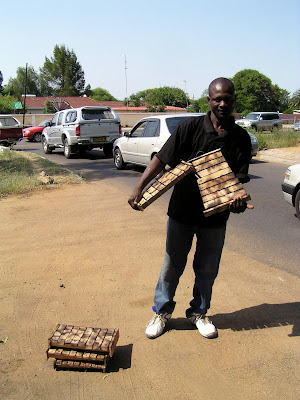A few weeks ago Willie and I rode down to the biggest shopping mall in Gaborone, "Game City". As we walked past a hardware store, Willie spotted some guitars - he can spot a obscure musical instrument from over 100 meters - and launched into an all-out emotional assault on the purchasing lobe of my brain. After repeating for the fifth time that we could not carry a guitar home on the airplane, we moved on.
But his instrument envy clearly had not subsided, so we chatted about the possibilities on the way home. I explained that I really wanted a marimba and Africa was a much better place to buy a marimba than a guitar. Elliot had also been learning to play the marimba and even played in a school concert with virtually no preparation.
Like most of the people we meet in Botswana, the marimba man is from Zimbabwe. His name is Tapiwa ("we shall be given" in Shona) and, along with making marimbas, he is actually quite a good marimba player. He has subsequently played a number of songs for me, which I have recorded and turned into a playlist on my phone. I played a few for the music teacher at Elliot and Mitchell's school and he was impressed, explaining that Tapiwa plays in a traditional Zimbabwean style.
Half serious, I inquired about whether he could make full sized marimbas and he said yes. How hypocritical would that be to reject outright Willie's guitar request and then lug a mammoth marimba home on the plane! This just wouldn't fly, but after processing this whim for a few days, I came up with a solution: I would just have Tapiwa make me the keys and build the frame back in Seattle. The keys are the hard part; they are made from wood found in these parts, need to be cut to the correct size, and then tuned by hollowing out the underside of each key just the right amount.















No comments:
Post a Comment